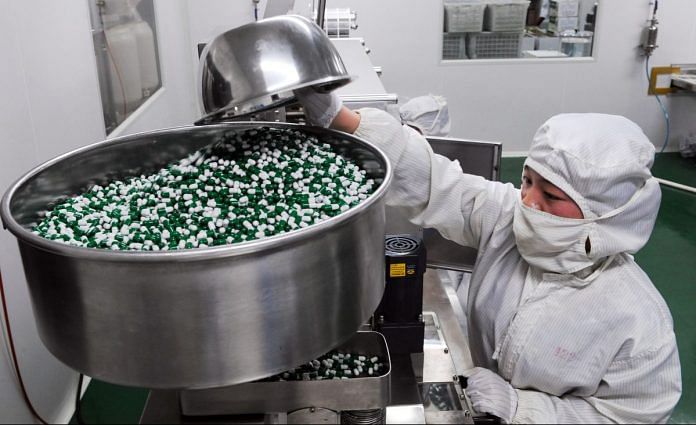Beijing recently announced the removal of import tariffs on Indian-made generics, especially cancer drugs, in light of rising healthcare costs.
New Delhi: It is perhaps just a coincidence but at a time a Chinese film about cheap Indian generics helping cancer patients in that country becomes a hit, India and China are set to tap pharmaceuticals as a new avenue of cooperation.
With Beijing agreeing to lift import tariffs on Indian medicines, especially cancer drugs, New Delhi is ready with a plan to push ‘Made in India’ drugs across the border, ThePrint has learnt.
Senior government officials will visit Shanghai for a meeting with Chinese importers in August and the union ministry of commerce and industry is likely to invite over 30 Indian pharmaceutical companies to accompany them, a top government source said.
An estimated 10,000 people are diagnosed with cancer in China daily and rising healthcare costs have spurred a big market for cheap Indian generics, which often cost a tenth of the price of their Western equivalents.
The movie, Dying to Survive, has been made amid calls for greater bilateral collaboration in the sector. Based on a true story, it released to a stunning opening this weekend.
Indian pharmaceutical firms too have been eager to enter the Chinese market on the back of falling exports to the US, once their biggest buyer.
‘A big opportunity’
The Indian delegation to China is expected to include commerce and industry joint secretaries Sanjay Chadha and Shyamal Misra, along with Udaya Bhaskar, director general of the Pharmaceuticals Export Promotion Council of India (Pharmexcil), an arm of the commerce ministry. The meeting is scheduled for the third week of August.
“The objective of the business meeting is to strike a conversation between Indian drug-makers and Chinese drug importers. (At the meeting) Indian companies would get a chance to understand the demand of Chinese drug importers,” Bhaskar told ThePrint.
“It is a big opportunity for Indian pharma exports and could help bring the industry’s cheer back,” he added.
However, before it sends out invites, Pharmexcil has been tasked with compiling a list of companies that manufacture, or can manufacture, the anti-cancer drugs exempted from import tariffs by China.
“The Chinese government has lifted the tariff from 103 anti-cancer drugs out of the total 138. We now have to find out which are the drugs that we are producing or we can produce for their market,” Bhaskar added.
A new market?
The recent fall in generics exports to the US has come as a blow to the Indian pharmaceuticals industry, as purchases by the country had been the most significant contributor to the sector’s growth and profitability in the past decade.
The slump follows warnings by the American drug quality watchdog, US Food and Drug Administration, over violations by Indian manufacturers, along with stricter checks. Rising competition in the US market has taken a toll on growth as well.
A similar environment awaits India in China, where local competition is strong and the drug regulator’s approval process stringent.
“The Indian government has been lobbying to ensure quick clearances and drug approvals, which take over two to three years. The country has only received assurances from the Chinese government and not action,” said a senior official of a Mumbai-based listed pharma firm.
China itself is on the lookout for stronger trade partnerships with other nations amid hostilities with the US on import tariffs that have threatened to explode into a full-scale trade war with global implications.
Steady exports of generics to China may also help India bridge its yawning trade deficit, which, at $60 billion, tilts heavily in Beijing’s favour.
The deficit is high within the pharmaceutical sector as well. Latest government data shows a spike of 50 per cent in the import of drug formulations and biologics from China over the last five years.
India, in fact, imports five to six times the drugs it exports to China, the figures reveal.
Drug formulations are ready-to-consume medicines. Biologics are a relatively new class of drugs manufactured within living organisms, such as recombinant insulin grown in laboratories inside common bacteria.



